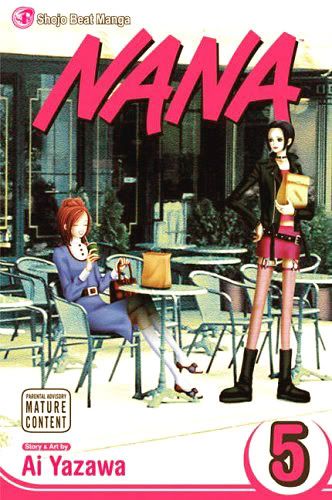 Nana vol. 5
Nana vol. 5Publisher: Shojo Beat/Viz Media
Writer/Artist: Yazawa Ai
English Adaptation: Allison Wolfe
Translation: Tomo Kimura
Capsule review: Hotel room trysts bookend Nana 5 as Nana and Hachi chase rock & roll fantasies and true love. Yazawa Ai's elegantly angular work gives the drama a fashion magazine gloss as new characters rise to prominence in the narrative and wishes fulfilled promise complications galore in this gripping, pivotal outing.
I had an epiphany during the recent Internet brouhaha over a certain caped crusader’s sudden passing. With stark clarity, I realized I have absolutely no emotional investment in that character, nor in any of his costumed compadres. Their lives, their deaths, their conflicts mean nothing to me after all these years. I remember as a teen I moped all day when I read about Jean Grey’s death. When DC killed off Superman in the 1990s, I was somewhat interested. Then I read the story and found it severely lacking except as a nakedly obvious publicity ploy and sales gambit.
And now, at this late hour, the bloom is definitely off the funeral lily. Because they constantly die and resurrect, because their stories seemingly have no end and the conflicts, plots and subplots endlessly repeat in a self-contained loop, because ultimately they’re nothing more than brand names and corporate logos, mainstream superheroes have achieved a flattening of effect. Or perhaps it's merely another example of the Law of Diminishing Returns. There are only so many times you can exploit the familiar, and there’s little drama or excitement amidst this colorful (or sometimes murky) frenzy, even when scripted by skilled writers. It’s meaningless. I’d be about as sad if someone murdered the Trix Rabbit.
So what fictional comic book characters do I care about? Thanks to the insanely appealing creative work of mangaka (that’s “comic book writer/artist” to you and me, Russ) Yazawa Ai, I’m absolutely obsessed with the soap operaish world of Nana, Hachi and all their friends. It’s all goopy, lovey-dovey drama queen stuff, but it’s compelling and addictive and fresh in a way Bat-this and X-that haven’t been in years. It’s happening as you read it!
I could say as much about Robert Kirkman’s The Walking Dead, but instead of “goopy, lovey-dovey drama queen,” substitute the words “gory, gut-wrenching horror zombie freak.” When Kirkman kills a character, it’s as if he came to your house and personally punched you directly in the stomach.
Yazawa hasn’t killed any of her cast so far, but volume by volume, she shows no reluctance to torture the reader with each new story development. In Nana 5, she places Nana and Hachi in the front row for a Trapnest concert back in Hachi’s little hometown. On guitar for Trapnest? None other than Nana’s ex-boyfriend Ren, the spike-haired Sid Vicious of J-Pop. As Hachi sends desperate mental commands for Ren to take notice of Nana, Trapnest completes their set and exits the stage. No reaction, at least as far as Nana and Hachi are concerned.
Backstage, it’s a different matter entirely. Bassist Takumi takes the usually perfect Ren to task for screwing up a song, and Ren rushes for some private time to make a quick cellphone call to his old friend Yasu: “Yasu?! Why’s Nana here?!”
In Yazawa’s glamorous version of Japan, even drug abusing rock gods have tender hearts. And a fierce, Vivienne Westwood-wearing punk rock girl, as hard and as vulnerable as any stray cat or Holly Golightly, finds herself looking foxy in sunglasses, black cami tank and ragged blue jeans (Yazawa clothes all her characters in exquisitely specific outfits; you could hit a hip shop in Kichijoji or Harajuku and put together any of the cast’s exact looks), making her way to Ren’s hotel for one final confrontation, and to return the key that unlocks the chain around Ren’s neck…
Things in Nana, as in life, seldom go as planned. But Yazawa takes these moments and turns them into page-burning cliffhangers. And it’s here, in volume 5, major events change both Nana’s and Hachi’s lives forever. And this is because when she's not meddling in Nana's love life, Hachi assigns herself to a "secret mission" she's all too eager to tell everyone about-- finding a boyfriend for herself. Candidates abound. Bald lawyer Yasu, Nana's sweet natured but somewhat naive bandmate Nobu, underage man-whore Shin, and the Trapnest fangirl's idol, Takumi. Hachi is forever plagued by selfishness, indecision, unrealistically romantic notions and a flighty nature, and yet Yazawa makes her a sympathetic charmer.
As Hachi says, "It's been a roller-coaster, but what an amazing day!"
But still, there's a strange melancholy that hangs over the series' signature “Hey Nana” narration:
Hey, Nana… I totally adored you. I wanted to be like you. I still feel that way to this day. So please… Sing for me one more time.
What happens down the line to Nana and Hachi that separates them and gives birth to this sad, dreamy reverie? Do the pressures of rock star fame alienate Nana from Hachi? Or... does something even worse tear their platonic love apart?
Vivid characters and heartbreaking situations and no idea whether we’re bound for joy or despair. Now that’s how you make a reader care about your protagonists. Sorry, superheroes, for all your sturm und drang and your plastic crap on clearance at Wal-Mart, you just can’t compete with Nana. And its plastic crap at Animate and Mandarake.

No comments:
Post a Comment